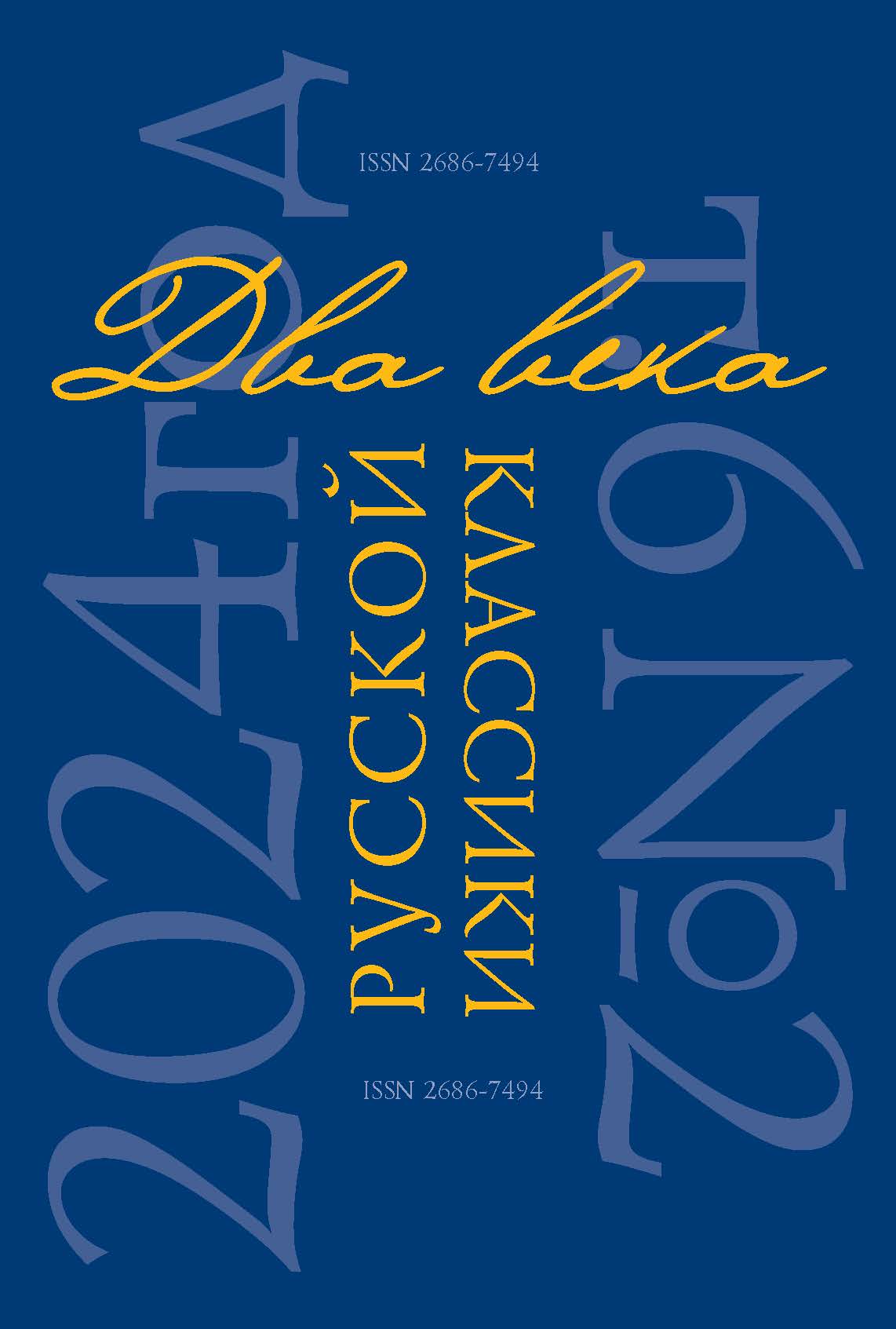Acknowledgments: This work was carried out at IWL RAS with financial support from the Russian Science Foundation, project no. 23-28-00450 “Wholeness / Fragmentation: L. Tolstoy’s Aesthetics in Philosophical Criticism and Theory of Literature in the First Third of the 20th Century” (https://rscf.ru/project/23-28-00450/).
Abstract: The paper examines crucial topics of reflection on the nature of art in L. N. Tolstoy’s works (1890–1900) in the light of their interpretations by V. B. Shklovsky. The principal part of these reflections is the search for a new mode of writing, “beyond any form,” which Shklovsky inherits and analyzes in his fragmentary aphoristic prose. The fragmentary forms in the late period of Tolstoy’s works and Shklovsky’s writing stem from the era of dramatic, rapid, and irreversible changes at the turn of the 19th–20th centuries. The paper pays particular attention to aspects of Shklovsky’s interpretation of Tolstoy’s technique of defamiliarization (ostranenie) and examination of the contexts of Tolstoy’s thought, which combine the themes of freedom, memory, and imagination in the existential, ethical, and aesthetic registers. Shklovsky translates Tolstoy’s existential thought into an aesthetic register, considering it as a result of a long process of emerging new forms in art.
References
Andreeva, V. G. “ʽLiubeznyi drug… ne serdis’ za otkrovennost’!’: perepiska L. N. Tolstogo i B. N. Chicherina” [“ʽDear Friend... Do not Be Angry for Frankness!’: Correspondence of L. N. Tolstoy and B. N. Chicherin”]. Dva veka russkoi klassiki, vol. 5, no. 1, 2023a, pp. 54–83. https://doi.org/10.22455/2686-7494-2023-5-1-54-83 (In Russ.)
Andreeva, V. G. “Khudozhestvennoe vremia v povesti L. N. Tolstogo ʽKhadzhi- Murat’.” [“Artistic Time in L. N. Tolstoy’s Novel ʽHadji Murad’.”] Filologicheskie nauki. Nauchnye doklady vysshei shkoly, no. 2, 2023b, pp. 62–71. https://doi.org/10.20339/PhS.2-23.062 (In Russ.)
Ginzburg, K. “Ostranenie: Predystoriia odnogo literaturnogo priema” [“Defamilia- rization: The Background of a Literary Method”], trans. by S. Kozlov. Novoe literaturnoe obozrenie, no. 4 (80), 2006, pp. 9–29. (In Russ.)
Kovel’man, A. B., U. Gershovich. Sokrytoe i iavlennoe v Talmude: Ocherk nefilosofskogo myshleniia na iskhode antichnosti [The Talmud Hidden and Reveled: Non-Philosophical Thinking in Late Antiquity]. Moscow, Indrik Publ., 2016. 448 p. (In Russ.)
Levchenko, Ia. “Poslevkusie formalizma. Proliferatsiia teorii v tekstakh Viktora Shklovskogo 1930-kh godov” [“Aftertaste of Formalism. Proliferation of Theory in the Texts of Viktor Shklovsky in the 1930s”]. Novoe literaturnoe obozrenie, no. 4, 2014, pp. 125–143. (In Russ.)
Pil’shchikov, I. A., and A. B. Ustinov. “Debiut Viktora Shklovskogo v Moskovskom lingvisticheskom kruzhke: Ot ʽistorii romana’ k ʽrazvertyvaniiu siuzheta’.” [“Victor Shklovsky’s Debut in the Moscow Linguistic Circle: From ʽHistory of the Novel’ to ʽUnraveling of the Literary Plot”]. Literaturnyi fakt, no. 9, 2018, pp. 314–334. https://www.doi.org/10.22455/2541-8297-2018-9-314-334(In Russ.)
Romanova, G. I. “L. N. Tolstoi o literature: istoriia i perspektivy izucheniia” [“Tolstoy About Literature: Historyand Prospectsof Study”]. Vestnik Kostromskogogosudarstvennogo universiteta, no. 1, vol. 26, 2020, pp. 138–143. https://doi.org/10.34216/1998-0817-2020-26-1-138-143 (In Russ.)
Romanova, G. I., and E. Tyshkowska-Kaspshak. “L. Tolstoi i formalisty o siuzhete” [“Leo Tolstoy and the Formalists About the Plot”]. Novyi filologicheskii vestnik, no. 3 (58), 2021, pp. 52–64. (In Russ.)
Sizova, I. I. “Lev Tolstoi v rabote nad romanom ʽDekabristy’.” [“Leo Tolstoy in the Novel ʽThe Decembrists’.”] Dva veka russkoi klassiki, vol. 1, no. 1, 2019, pp. 104–117. https://doi.org/10.22455/2686-7494-2019-1-1-104-117 (In Russ.)
Smirnova, N. N. Fragment i nezavershaemoe proizvedenie: zamysel, chtenie [Fragment and Unfinishable Work: Concept, Reading]. Moscow, Kanon+ Publ., 2023. 288 p. (In Russ.) Soshkin, E. “Priemy ostraneniia: Opyt unifikatsii” [“Methods of Defamiliarization: Experience of Unification”]. Novoe literaturnoe obozrenie, no. 2 (114), 2012, pp. 178–193. (In Russ.)
Soshkin, E. “Opera glazami Natashi Rostovoi i imperatora Avgusta. K vyiavleniiu literaturnykh istochnikov tolstovskogo ostraneniia” [“Opera Through the Eyes of Natasha Rostova and Emperor Augustus. Towards the Identification of Literary Sources of Tolstoy’s Defamiliarization”]. Zvezda, no. 12, 2019, pp. 190–193. (In Russ.)
Shcherbakova, M. I. “L. N. Tolstoi v otsenke sovremennikov: iz perepiski N. N. Strakhova i P. D. Golokhvastova” [“L. N. Tolstoy in the Assessment of His Contemporaries: From the Correspondence of N. N. Strakhov and P. D. Golokhvastov”]. Ostrova liubvi BorFeda. Sbornik k 90-letiiu Borisa Fedorovicha Egorova [Islands of Love BorFed. Collection for the 90th Anniversary of Boris Fedorovich Egorov]. St. Petersburg, Rostok Publ., 2016, pp. 988–993. (In Russ.)
Toland, Kristina. “Path of Life: Lev Tolstoy’s Prescriptive Spiritual Diaries.” Tolstoy Studies Journal, no. 24, 2012, pp. 15–25. (In English)









